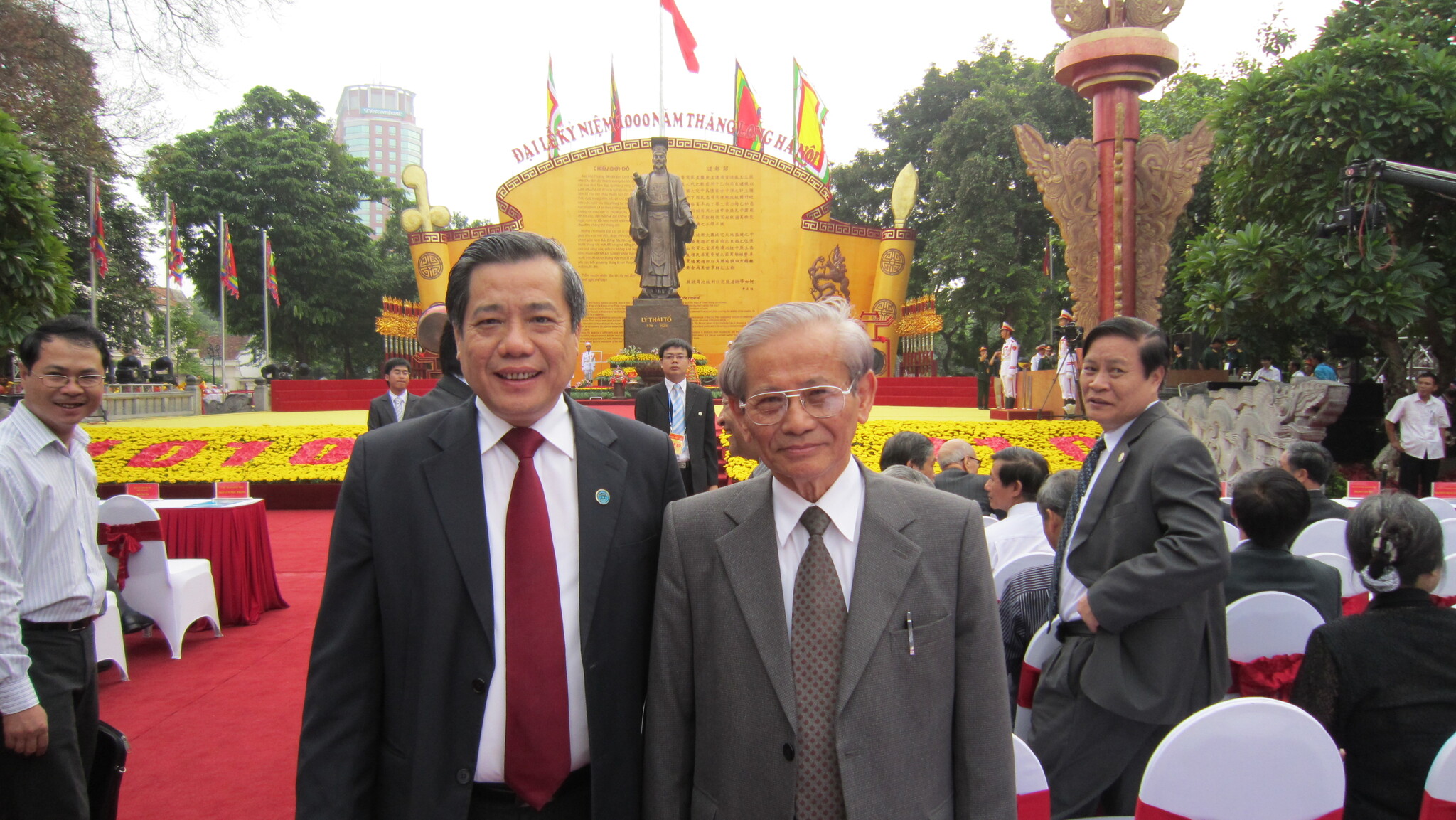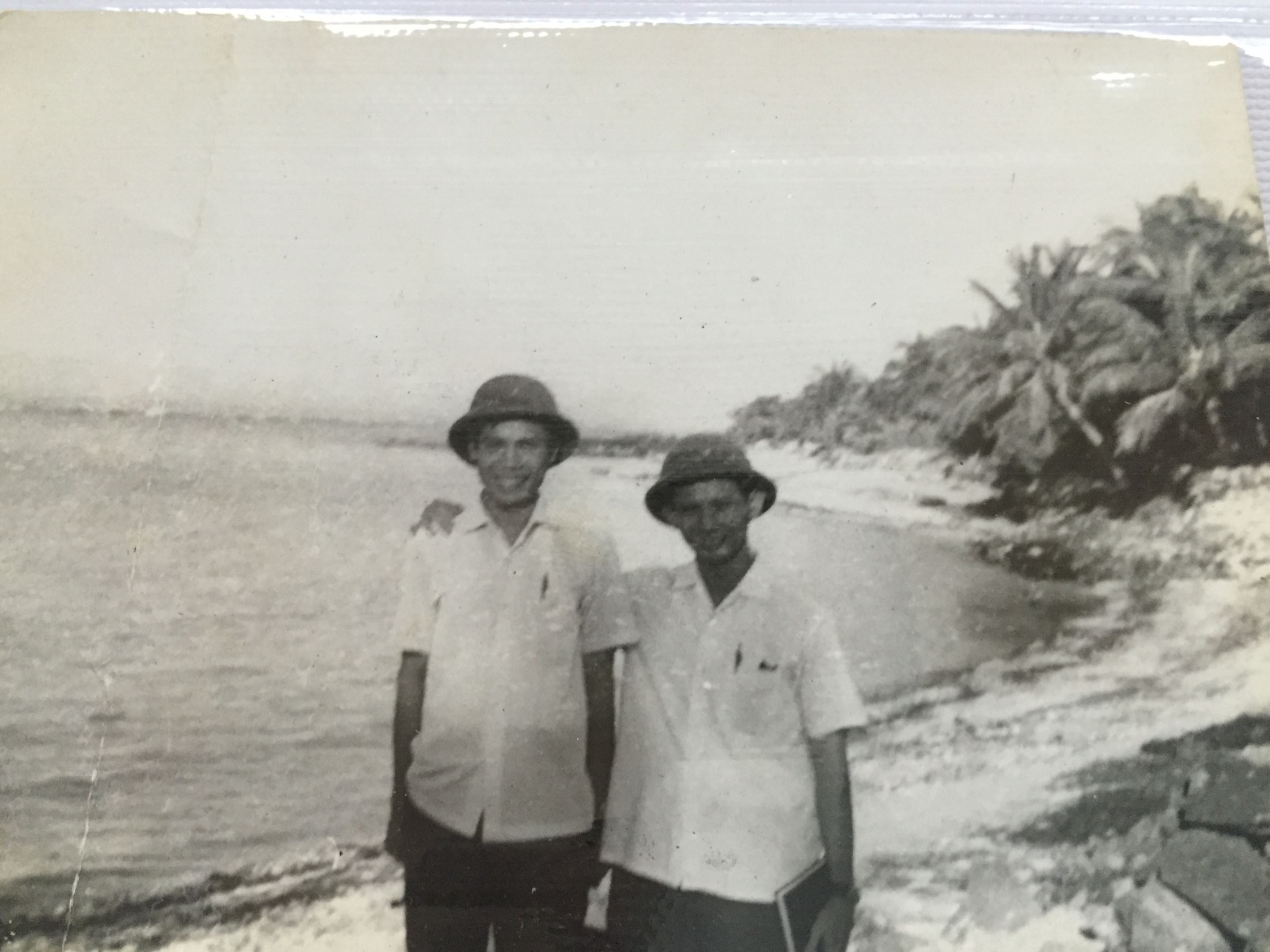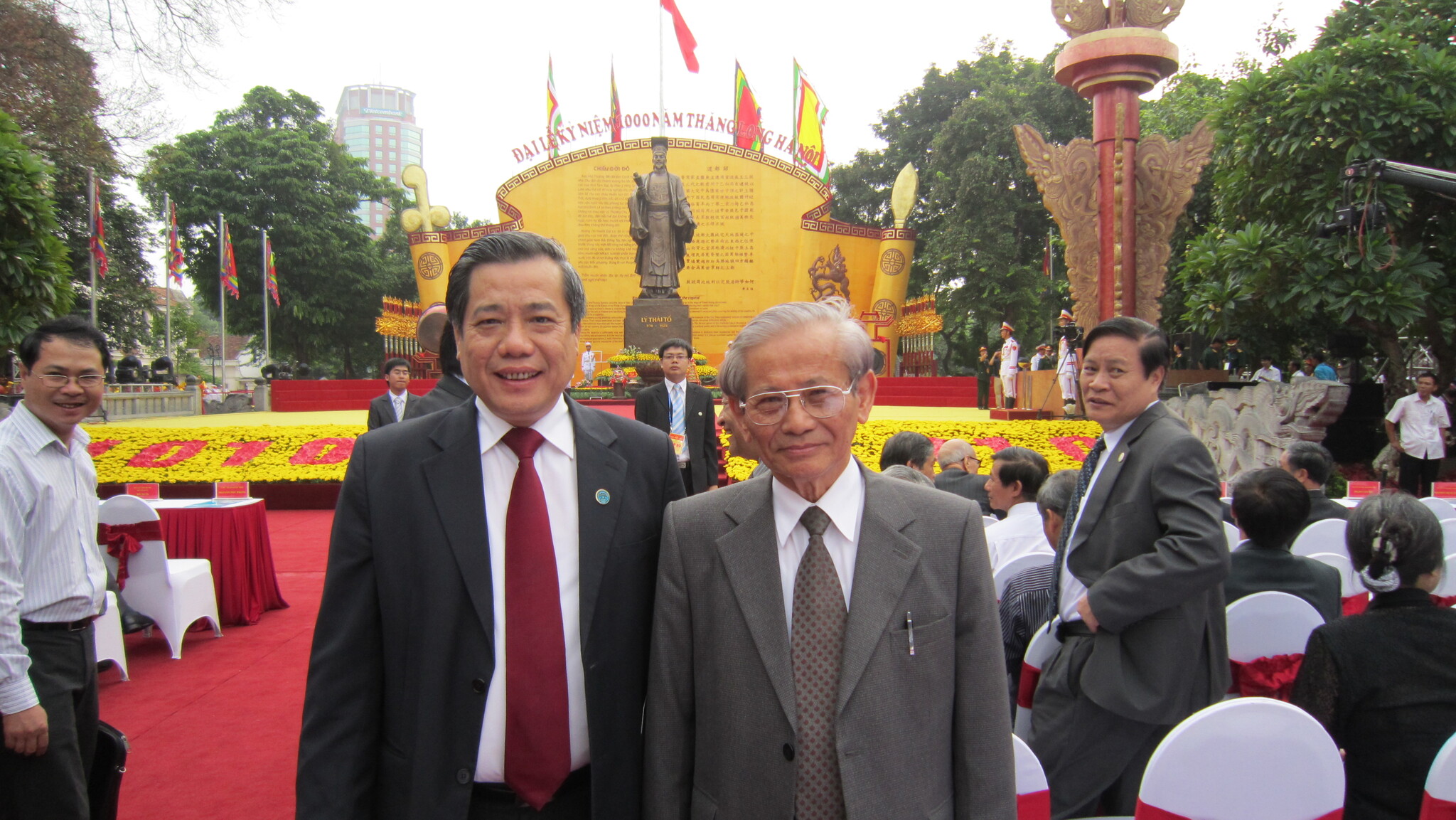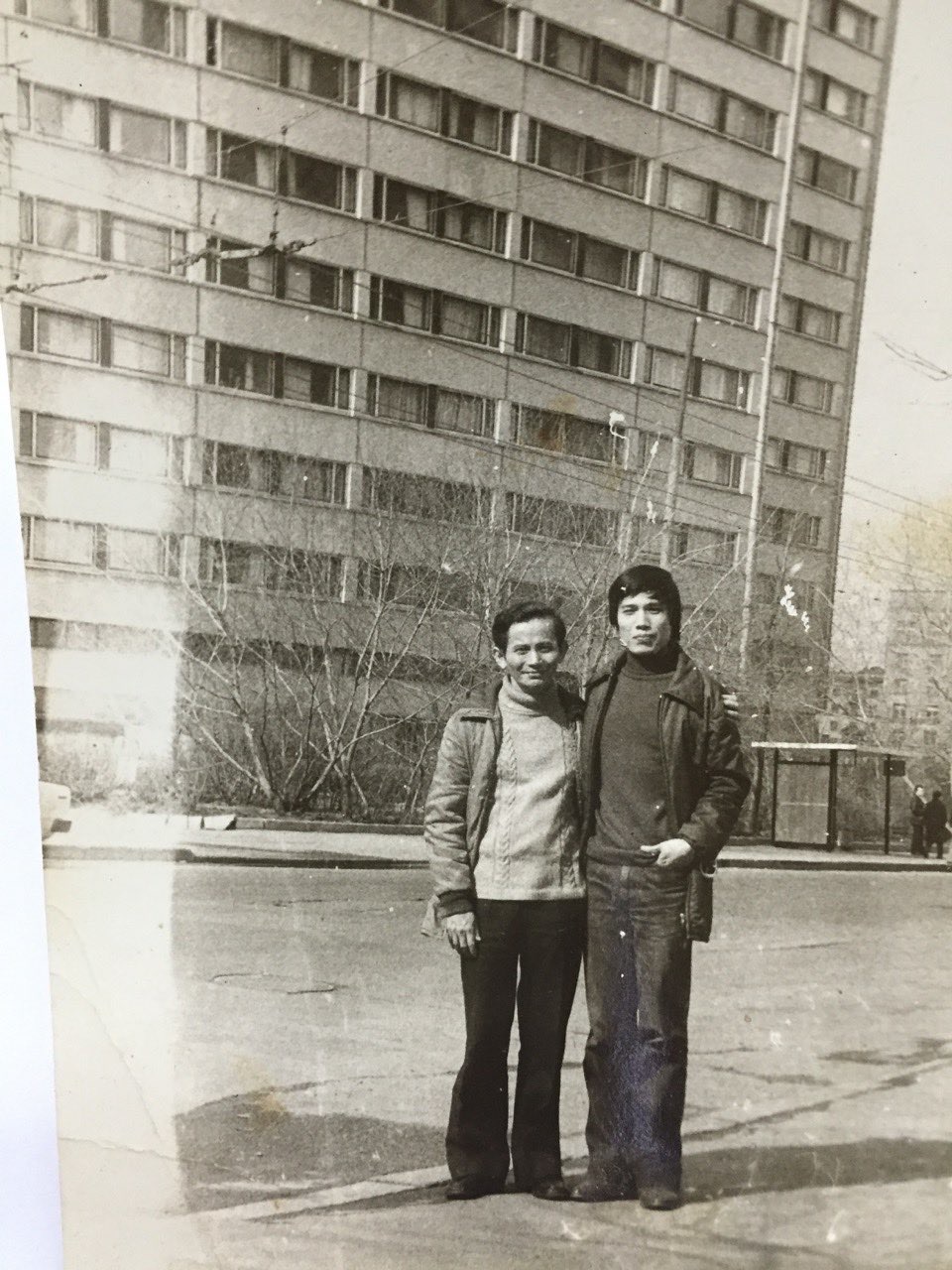
In memory of the Teacher, I would like to tell here some stories that I think will contribute to increasing the Teacher's stature but perhaps many people do not know.
The journey of a thousand miles of textbooks
At the end of 1975, I was fortunate to join a delegation from the Ministry of Universities and Vocational Secondary Schools to work at the Saigon University of Letters. At that time, the South was still nominally run by the military authorities at all levels of the Provisional Revolutionary Government of the Republic of South Vietnam. I have to say this at length to fully understand the meaning of the story I want to tell.

Professor Phan Huy Le (right) and Professor Vu Minh Giang during a survey trip to Ly Son Island in 1977.
The story goes like this: After arriving in Saigon, our group was arranged to stay right on the campus of the Faculty of Letters. Although not large, the school has a valuable asset that generations of professors and students are very proud of: the Library. We were invited there to visit and make reading cards. It is truly an admirable library. Here, for the first time, I saw the complete set of journals such as BEFEO (Bulletinde l'École française d'Extrême-Orient), BAVH (Bulletindes Amis du Vieux Hué), BSEI (Bulletinde la Société d'Études Indochinoises)… When I reached the rare bookcase, what immediately caught my eye were two thick books of a very familiar size, carefully bound in hard covers. When I got closer, I could hardly believe my eyes when I read on the spine the wordsHistory of feudalismVolume II, authored by Phan Huy Le. The next volume is Volume III of the same series, edited by the Teacher. I wondered and asked the librarian, since Saigon had just been liberated and the school had not yet reopened, how could the library have these two sets of textbooks so quickly?
The librarian said that these books had been in the library for many years before the liberation of Saigon. As if seeing our surprised faces and curious eyes, the librarian leisurely explained why Professor Phan Huy Le's works were placed in the school's precious bookcase so early. It turned out to be a long and quite thrilling story. During the period when the two regions were still divided, although the University of Letters had almost no contact with the North, some professors often traveled back and forth to France, so they had the opportunity to come into contact and quickly recognized the scientific value of these books. The University of Letters had to ask French scholars to help buy a set via Moscow.
Thus, Mr. Le's textbooks traveled nearly 20,000 km from Hanoi to Saigon in the early 70s of the last century. This event itself speaks to the unique value of the work.
Perhaps because the name of Professor Phan Huy Le had overcome all barriers to reach the Southern historians so early, when he first started teaching at the University of Letters, teachers and students of the school expressed special sympathy. The only thing, according to a teacher told me, was that Professor Le was much younger than they had previously imagined.
The Emperor's mausoleum is also a creation of the people.
There is a rare story that I would like to tell here so that everyone can understand more about the character, intelligence and persuasiveness of Professor Phan Huy Le. I remember around 1977, I was an assistant to the Professor on a survey trip and helped final year students collect materials for their graduation thesis in Binh Tri Thien. The Head of the Provincial Department of Culture invited the Professor to his house for dinner. In the story, the head of the department mentioned a problem that the province was facing. That was the restoration of relics related to the Nguyen Dynasty. Over time and the impact of war, many relics (citadels, temples, mausoleums, etc.) were damaged, degraded and even ruined, but the government did not prioritize solving them. During that period, this was considered normal. Having just emerged from the war, the government still had hundreds of thousands of tasks to handle.
At that time, UNESCO kindly offered Hue a budget to urgently fix the serious situation of some relics, including the tomb of Emperor Gia Long. It was thought that this was a lucky opportunity, but unexpectedly it became a difficult situation. Some key leaders of the province firmly disagreed with the policy of receiving money to restore the relics with the reason: when the province was still having to solve countless difficulties, it was not the time to repair the tombs of feudal kings and mandarins, especially the king who had "snake bites chicken" (meaning King Gia Long).
In a seemingly insurmountable situation, the Chief of the Department came up with the idea of asking Professor Le to convince the provincial leaders and he accepted. I don't remember the exact words, but the gist of his argument was as follows:
- Can you share with the leaders about not prioritizing the restoration of relics while the province has countless other urgent tasks that need to be solved, but preserving and restoring relics must be done sooner or later. The urgent nature of the work as proposed by the Department of Culture is not innaturebut by the degreeurgentof the work. If these relics are not reinforced in time, they may collapse and be lost forever. Our descendants may blame us for this.
- The citadels, temples, and mausoleums of kings and mandarins are the crystallization of the labor of craftsmen throughout the country. Restoring relics is to preserve the nation's architectural and artistic works, the fruits of the people's labor.
- The owners of those mausoleums, no matter who they are, are all historical figures. Their merits and crimes will be judged by history, but even if they are villains, preserving the material relics will be much better for education than just talking about them later…
- Although it is urgent, but when the province is facing difficulties (especially when people are still lacking food), we cannot prioritize funding for this work. This is a UNESCO-funded amount of money, it cannot be used for other purposes. If we do not accept it, we will be judged negatively in terms of cultural awareness.
The results were surprising. Professor Phan Huy Le's arguments convinced the most difficult leaders. The province agreed to accept the funding to promptly restore the dilapidated relics. This story was repeated many times by the Department Head, who later became a high-ranking official[i].
The students I don't know
In his career as a teacher for more than half a century, Professor Phan Huy Le has trained many generations of students. Even though there were so many, when meeting again, it seemed like everyone had the feeling that the Teacher still remembered them. Just mentioning a certain characteristic of the class, the Teacher immediately talked about a series of memories associated with that group. For example, a former student of K13 only needed to say "I studied in Trai Chuoi class" (the evacuation location during the war) and the Teacher immediately mentioned that "you were the class I taught in the pagoda in Cao Vien, Binh Da"... Yet there was a story that the Teacher did not "remember" the faces of his students.

Professor Phan Huy Le and Professor Vu Minh Giang at the 1000th Anniversary Celebration of Thang Long - Hanoi
During a business trip with the Teacher, I witnessed a rather interesting reunion. That was when the leaders of Quang Nam - Da Nang province invited the Teacher to consult on the preservation and promotion of the value of the ancient urban heritage of Hoi An. During the meeting, the Provincial Party Secretary welcomed him very warmly, calling him "em" as if he were a former student. Although he was always very polite, the Teacher did not have the gestures I often saw when meeting former students in other localities. Looking at my face, it was not difficult to realize that the Teacher had never met this comrade. It seemed to also recognize the Teacher's awkwardness and suddenly thought of something, the Secretary gently reminded him of the special circumstances of the class where the Teacher had taught. That was during the war, the Secretary was working secretly in the inner city, so when he went to the North to study, every time he went to class, he had to cover his face with a sack, leaving only his eyes exposed so that those around him (including the lecturers) would not recognize him. After listening, I heard the Teacher say “Ah” and the conversation became unusually intimate. Through this somewhat coincidental story, I learned that the Teacher had been invited by the Nguyen Ai Quoc Academy to give lectures to high-level political classes, including students who were secretly operating in the cities. Comrade Secretary was one of them[ii]
The Master's work is not only what people usually see, but also special tasks like that.
“The War” in Tasken
In the early 80s of the last century, when I was a graduate student at Moscow University, a delegation of senior Vietnamese scholars, including Professor Phan Huy Le, went to the Soviet Union to attend an important scientific event. I visited him at the hotel of the Soviet Academy of Sciences and learned that the purpose of the delegation's visit was to attend an important conference on national issues to be held in Tasken.

Prof. Phan Huy Le (left) andProf. Vu Minh Giang (right)before the business trip Tasken
At that time, the theoretical system in the academic world in socialist countries was mainly based on the classic works of K.Marx, F.Engel, V.Lenin and G.Stalin. Regarding the national issue, the definition was stated by Stalin in the bookMarxism and the national questionwith four "common" criteria:common language, common territory, common economic lifeandgeneral psychological formexpressed within a common culture that is considered the norm. Stalin's important thesis in this definition is that if any one of the four criteria above is missing, it does not qualify as a nation, butcommon economic activitiesmust be linked to the national market, linked to capitalism. In other words, the nation cannot be born before capitalism. According to this definition, Vietnam does not have a nation in the true sense of the word. This is something that Vietnamese scholars find difficult to accept. The difficulty is that Soviet scholars consider this definition as a guideline, meaning that if it were different, it would be tantamount to “revising” classical theory. They invited leading Vietnamese scholars to the capital of the Republic of Uzbekistan to, with a strong force and the historical reality of a fairly typical Asian country, convince Vietnamese scholars to acknowledge the “universal law”.
When we met again in Moscow after “campaign Tasken"I saw that the teacher was unusually enthusiastic. He told me about the dramatic events during the conference and in the end, the Soviet scholars were convinced that in Vietnam, the nation was born early, and national consciousness had matured before capitalism. Professor Phan Huy Le had a very important speech that contributed to this "academic feat", but had great political significance. The teacher's basic argument was based on historical facts. This was the scientific basis for the topics, articles and main viewpoints in major works on the formation of the Vietnamese nation.
Need to continue research on Nguyen Dynasty
Let me say right away that these are not the words of Professor Phan Huy Le but the idea of former General Secretary Do Muoi during his working session with the Teacher.
In October 2008, there was an event that attracted special attention both domestically and internationally. That was the National Conference.Lord Nguyen and Nguyen Dynasty in Vietnamese history from the 16th to the 19th centuryThe conference was jointly organized by the Vietnam Historical Science Association and Thanh Hoa province. With the participation of more than 600 delegates, including a number of overseas Vietnamese, the conference raised scientific awareness of the Nguyen Lords and Nguyen Dynasty to a new level. In particular, the profound and significant summary of the conference by Professor Phan Huy Le immediately became the basis for research works and lectures on this historical period.

Professor Phan Huy Le and Professor Vu Minh Giang in the survey of Cat Tien National Park
However, immediately after the Conference, some opinions began to strongly react, saying that the assessments of the Nguyen Dynasty, a reactionary dynasty that was overthrown by the revolution, should be condemned as a principled viewpoint. Anyone who said otherwise or re-evaluated the Nguyen Dynasty violated this principle and needed to be criticized. With such a way of posing the issue, some people wrote articles distorting the results of the Conference, attacking Professor Phan Huy Le, who was considered the soul of the Conference. Not stopping there, they also wrote letters under the name of "denunciation" and "petition" to management levels and some leaders and former leaders of the Party and State.
During a business trip with the Master in Ho Chi Minh City, I received a phone call from former General Secretary Do Muoi. It was unclear who had influenced him and to what extent, but the former General Secretary was extremely upset. After some thought, the Master decided to meet the former General Secretary in person. I was able to accompany him to this meeting.
As expected, the former General Secretary harshly criticized the viewpoints and methods (not sure who provided them) aimed at "find a way to exonerate the Nguyen Dynasty king and mandarins”. After listening to the opinion of comrade Do Muoi, Professor Phan Huy Le presented with very gentle and calm words. Without a single word of criticism against the opinions that reflected incorrectly on the Conference or debated about viewpoints, he focused on three points:
- If viewed from the historical materialist perspective, any feudal dynasty can point out its contributions to history and find its limitations (or popularly known as "merit and crime”). Let history judge this.
- Perception is a process and history is no exception to this rule. The further back in history, the clearer the characters and events will be. According to that point of view, in the spirit of the Party's Renovation, many historical issues need to be reviewed in a more objective and scientific way. Vietnamese history from the 16th to the 19th century is one of the periods with many new research results that need to be summarized and oriented for further research. The conference was just held for that purpose.
- Regarding the assessment of the role of the Nguyen Lords and the Nguyen Dynasty, whoever has limitations or "crimes" against the nation must be responsible before history. The judgment of history is always fair, no one can justify or absolve them. However, we cannot deny all contributions because of limitations. The Nguyen Lords' contributions in organizing the exploration and establishing sovereignty over the southern land were immense. The Nguyen Dynasty built a unified nation after many years of division and left a huge cultural heritage for the nation, which were not small contributions. In particular, the cause of affirming and protecting sovereignty over the sea and the two archipelagos of Hoang Sa and Truong Sa by the Nguyen Lords and the Nguyen Dynasty, especially under the reign of the two emperors Gia Long and Minh Mang, was extremely great. If we downplay the historical role of these governments, it will invisibly reduce the value of historical and legal documents on our sovereignty.
With a scientific, objective attitude and solid arguments, Mr. Le completely convinced the former General Secretary, causing him to return to his original innocence, smile and say:Then comrades need to continue research on Nguyen dynasty.
*
* *
Professor Phan Huy Le is a national-level pedagogical and scientific figure with great influence in the international arena. To fully appreciate his contributions to the country, to the country's history and to his reputation among international scholars, there must be worthy research works. The above stories are just a collection of some of the times I accompanied him over the past 50 years. I tell them in the hope of contributing a few small details to help everyone understand more about his character, intelligence and contributions in times and circumstances that not everyone knows.
[ii] The Secretary of the Quang Nam - Da Nang Provincial Party Committee at that time was comrade Nguyen Van Chi.
Author:Prof. Dr. Vu Minh Giang - Chairman of the Science and Training Council of VNU
Newer news
Older news